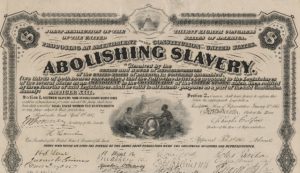Abraham Lincoln, sustainability, and the “King’s Solution”: the Thirteenth Amendment
I’ve been learning more about abolition in the United States.
In 1776, thirteen slave states, likely no one could imagine a world or nation without slavery. Yet in 1865, the Thirteenth Amendment made us one free nation comprising thirty-six free states. Today no one would seriously propose repealing the Thirteenth Amendment, what Lincoln called the “king’s solution.” No law, judicial interpretation, or executive order could achieve what it did. On the contrary, relying on them delayed uniting the U.S. in outlawing what a majority of Americans wanted to outlaw.

I am going to propose to you something as bizarre of someone in 1787 proposing a constitutional amendment banning slavery: an amendment banning pollution. To many today, the Thirteenth Amendment sounds so inevitable, we can’t imagine it was hard to imagine. Growing up, I learned that slavery was bad and had been around for a long time, but the march of progress from the Renaissance through the Enlightenment and beyond made it inevitable. Many of us are shocked, even recoil with horror, at how long we took to pass it.
Future generations will be shocked and recoil with horror at how long we are taking from considering an amendment banning pollution to passing it. As hard as it may be to imagine when you first hear it, soon opposing it will be like slave states resisting the Thirteenth Amendment. As then, profits will today corrupt people to support what they know hurt people, leading to industries opposing it, as industries opposed abolition.
I hope you won’t stand in its way. If you pollute and can’t imagine a world without pollution, I hope you support it in the way I’d hope a slave holder in 1800 would come around to support abolition and eventually the Thirteenth Amendment. No law, judicial interpretation, or executive order can achieve what it can. On the contrary, relying on them is delaying uniting the U.S. in outlawing what a majority of Americans want to outlaw.
As a reminder of how impossible the Thirteenth Amendment looked days before the House of Representatives passed it, here’s Daniel Day-Lewis’s dramatization of that challenge in Steven Spielberg’s Lincoln:
Read my weekly newsletter

On initiative, leadership, the environment, and burpees